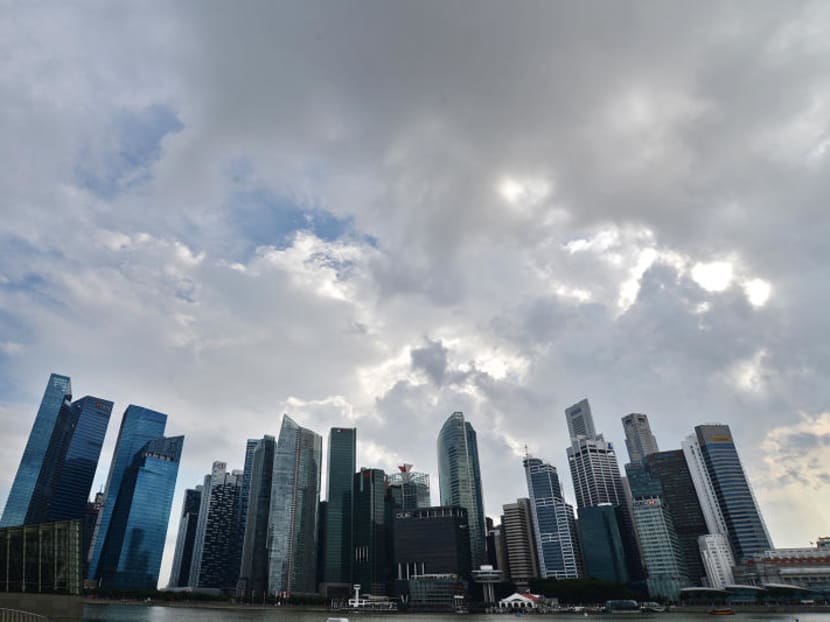Economy to pick up slightly next year but growth to stay subdued: MAS
SINGAPORE — The sluggish Singapore economy should recover slightly next year, supported by the modern services and domestic-oriented clusters, the Monetary Authority of Singapore (MAS) said in its twice-yearly Macroeconomic Review report issued on Tuesday (Oct 25).
SINGAPORE — The sluggish Singapore economy should recover slightly next year, supported by the modern services and domestic-oriented clusters, the Monetary Authority of Singapore (MAS) said in its twice-yearly Macroeconomic Review released today (Oct 25).
"In the coming quarters, the Singapore economy should see some recovery alongside the mild firming in global growth. A bottoming-out in financial intermediation and firm demand for information and communications technology services should lend support to the modern services cluster, while public spending on capacity expansion in healthcare and transportation services will anchor domestic-oriented activities," the MAS said in its 125-page report.
Still, it warned that Singapore’s gross domestic product (GDP) is not expected to pick up significantly in the near term. The central bank reiterated the projection that growth will come in at the lower end of the 1 to 2 per cent range this year and said growth will be only slightly higher next year.
Within the modern services cluster, the drag from financial intermediation activity has shown signs of dissipating. The gradual normalisation of global interest rates, alongside structural growth drivers, such as the rise in regional affluence, will help to bolster fund management activity, the MAS said. Demand for infocomm services is expected to remain firm, supported in part by increasing ICT adoption among both domestic and regional corporates, as well as the step-up in government expenditure on ICT infrastructure initiatives, it added. At the same time, domestic-oriented sectors are expected to remain a stable source of growth as the Government plans to enhance healthcare and education services.
Economists said that unless external demand picks up, the Singapore economy will stay in the doldrums.
CIMB Private Bank economist Song Seng Wun said: "Realistically speaking, these clusters do not provide much support to the economy. Modern services can be anything that adds or helps businesses to streamline processes: It’s how businesses call on other service providers to streamline or be more efficient in doing business, how you can help businesses increase their volume through new ways — advertising, delivering services and incorporating big data. But these are all small businesses in the big scheme of things."
Mr Song added: "At the end of the day, we are an export-dependent economy. It still boils down to how busy Changi Airport is, how busy our ports are. Unless we see a very firm pick-up in global demand, led by the United States, European Union and the rest of Asia, we may just plod along."
Export performance is expected to remain subdued given Singapore’s exposure to the wobbly global markets, the MAS said. "While the risk of a major global downturn has subsided somewhat, external demand will continue to be uneven across a number of Singapore’s key export markets ... As one of the most trade-dependent economies in the world, Singapore is inevitably impacted by subdued external demand and global trade," it said in its report.
The Singapore economy suffered its worst slump in four years in the third quarter, shrinking by 4.1 per cent from the previous quarter on a seasonally adjusted annualised basis, advance estimates from the Ministry of Trade and Industry showed earlier this month. Compared with the same period a year earlier, GDP rose 0.6 per cent in the third quarter, easing from the 2 per cent growth in the previous quarter.
While the Committee on the Future Economy (CFE) — tasked with developing strategies for Singapore to become a vibrant and resilient economy with sustainable growth — is expected to complete its work by the end of the year, economists note that it is not likely to contribute much in addressing the immediate issues.
"The CFE looks more at medium-term competitiveness of Singapore. They are talking about new industries, new areas that Singapore could focus on as a growth engine for the next five, 10, 15 years. For fiscal measures to help with the cyclical downturn, we are looking more at the Budget next year, or other possible off-Budget measures if there is a recession," said Ms Selena Ling, head of treasury research and strategy at OCBC bank.
"You have both a combination of cyclical factors — sluggish global growth, weak external demand, China’s slowdown, and structural factors — changing patterns of trade, changing comparative advantage in certain industries. So it’s a bit of an unfortunate timing for them coming together. This period of slow growth will be more protracted."







